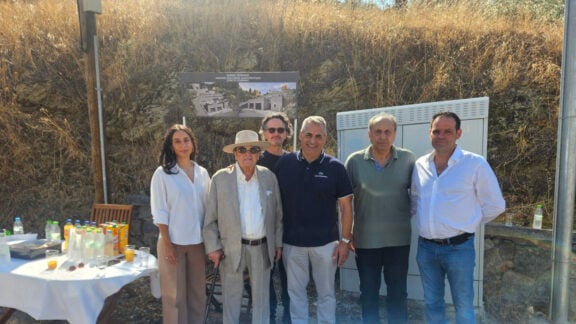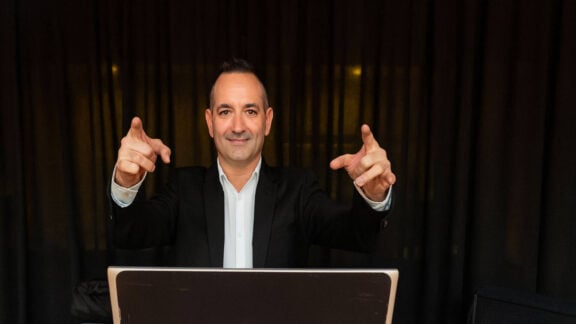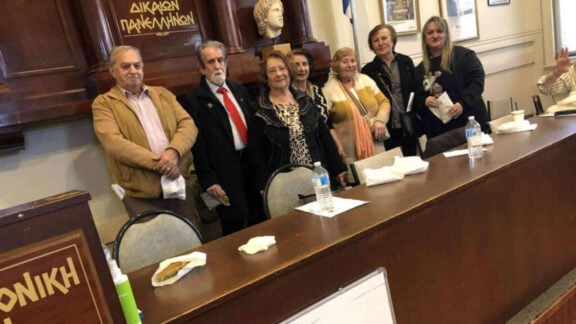“Convincing means making someone think that something is right or behave in a certain way. To persuade someone to do something applies more elaborate techniques.”
“Parties with realistic chances to build a government are voted for the public image of their leaders.”
Professor Angelos Chaniotis opened his Melbourne lecture with this topic; the theatricality of public life.
As the country is well into its federal election campaign, these nuances that go unnoticed most of the time speak louder than words.
Think body language, think tone of voice, and think appearance.
Professor Chaniotis is currently in Australia, touring the country as a guest of the Australian Archaeological Institute of Athens. World famous in the academic world, he is known for his work at the Institute of Advanced Study at Princeton University and focuses on the classical world by looking at strategies of persuasion, memory and emotion.
Theatricality is something the ancient Greeks understood very well.
In the 5th century BC, it was not uncommon to see the political elite take lessons from actors on how to speak at the Assembly. Gestures, like inclining the body forward, placing a hand on their heart or just draping their robes in a specific way would be a calculated tactic in not just convincing, but persuading people for a vote.
During the electoral campaign in Greece in September 2007, one of the leading political parties circulated amongst its candidates guidelines concerning their public appearance. It included recommendations about types of clothes that should be avoided, hairstyles, jewellery, appropriate colours of ties for men, and body language.
Professor Chaniotis explains the use of these tactics thrust New Democracy’s Kostas Karamanlis into power.
Showing a photo of Kostas Karamanlis on election night, victorious next to his wife, Professor Chaniotis superimposed them next to an ancient Greek statue of a king holding a spear. The image showed just how universal theatricality in public life is.
“The image of Kostas Karamanlis evokes peace and tranquillity, in a direct opposition to the passionate and loud campaign period,” he says.
“This photo was not staged; but if the PR managers of Karamanlis were to stage a photo, this is most likely how it would look like, and this is precisely why this image was selected among hundreds of others.”
Theatricality, from controlling body language, deepening a voice or wearing certain clothes, are a form of deception, Professor Chaniotis summarised.
Amazingly the Greeks were well aware of all these tactics, and even came to expect them from their leaders.
The word for deception, ‘apate’, in ancient times became a synonym for entertainment.
Even those who made an effort to move away from these tactics, in a sense to look more honest and be less energetic were using a form of deception – rebelling from the norm was in fact an act of theatricality.
Professor Chaniotis has spent years studying the strategies of persuasion in the ancient and modern world.
In his findings, he separated two words that tend to be used interchangeably.
“There is a distinction between convincing and persuading,” he tells Neos Kosmos.
“Convincing means making someone think that something is right or behave in a certain way. To persuade someone to do something applies more elaborate techniques, for instance you may persuade someone through appeal into the senses of emotions or by using your body language.”
Persuasion strategies aren’t just used by the powerful, he remarks. There are strategies the weak use to persuade those in charge, strategies that are used by different relationships; the king and the subjects, the defeated and the victorious, the province and the empire.
People use the art of persuasion every day, even when they pray.
“You try to make the god, Artemis or Apollo, do what you want,” Professor Chaniotis remarks.
The art of persuasion links into memory too. As part of the professor’s 35 year study on the subject, he went to the ancient city of Aphrodisias in Asia Minor to track how generations of citizens changed their history to appeal to a greater, more heroic identity.
The city indicated a massive change in its identity between its founding in 200 BC up until 500 AD.
“In the course of time, a lot of communities compete, so the older you are the more prestigious you are,” the Professor says.
“So the Aphrodisians had to create a memory that the city was founded much, much earlier by a mythical hero as far back as you can go in history.”
It makes you think just how much of our memory is manufactured.
History has always been written by the elite, who focus on what they think future generations should remember, while embellishing stories of victory and heroism and erasing those unimportant to the story, like slaves and women.
Memory is a calculated thing, even we are guilty of influencing what the next generation will remember. We make conscious decisions to keep certain things, like books or trinkets, and throw out others that we might not like, influencing what the next generation sees and remembers.
For Professor Chaniotis, memory is what has shaped his own career. In his early school days in Athens, he remembers his mother taking him to museums, and fondly remembers visiting the Parthenon when it was still accessible to the public. “I remember walking though the Parthenon,” he says with a smile.
At that point he was juggling whether to be an archaeologist or a modern historian. As a young student, witnessing history unfold before his eyes as the junta rolled in made a lasting impression.
“Another important influence was the dictatorship because I was seven when the junta came, I was 14 when it collapsed and when you experience important historical developments during your childhood, somehow you may be interested also in ways… these events are representative, sometimes concealed, interpreting the events and so on,” he says.
As his career unfolded, specialising in ancient inscriptions, he did live the life of Indiana Jones and assisted on many digs around Greece, Turkey and Egypt, while studying different forms of communication in the ancient world.
He is currently focusing his time on writing his next book around the study of emotion, memory and identity. As a prolific academic writer, having published four books and currently the senior editor of Supplementum Epigraphicum Graecum, his work has changed the way people in the field look at communication in the ancient world.
Professor Chaniotis is touring Australia in August and September, giving a series of seminars and public lectures on various topics, including graffiti in the ancient world, theatricality in public life and religion. He has already visited Sydney and Melbourne.
Hobart
Tuesday 27 – 6.00 pm:
The University of Tasmania, Centenary Theatre ‘No Way to Treat a Statue!’
Adelaide
Friday 30 – 7.00 pm:
The University of Adelaide: ‘Theatricality and Illusion in Public Life’
Perth
Thursday 5 – 6.00 pm:
The University of Western Australia: Austin lecture Theatre: ‘No Way to Treat a Statue!’
Canberra
Tuesday 10 – 8.00 pm:
The Australian National University: ‘Hope Fear and Gratitude in Ancient Sanctuaries’
Brisbane
Thursday 12 – 6.30 pm:
The University of Queensland: ‘Petrified Voices, Petrified Feelings’






